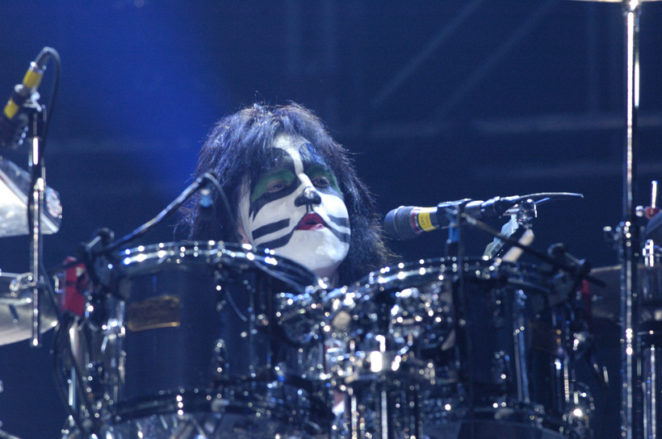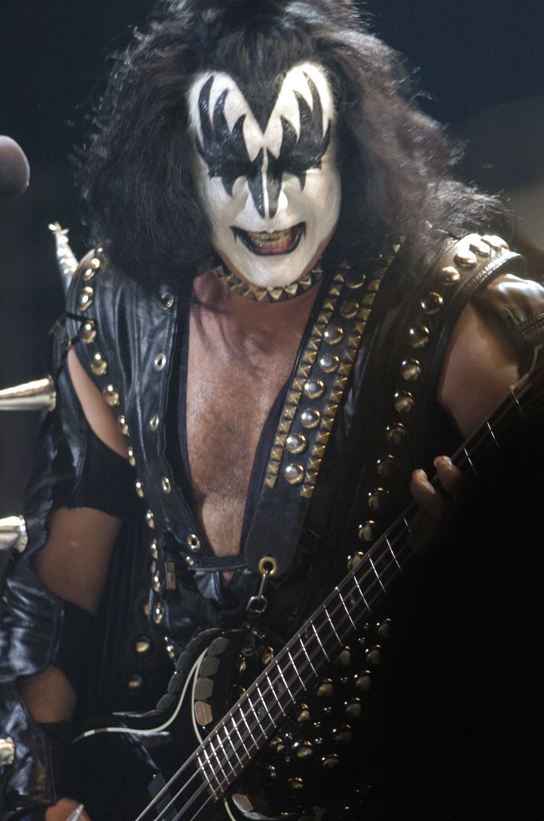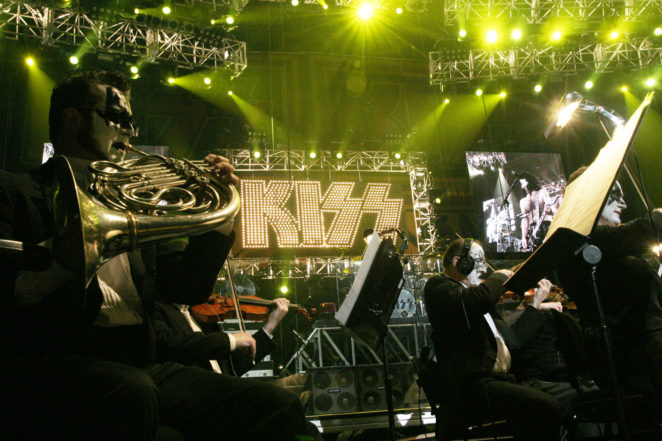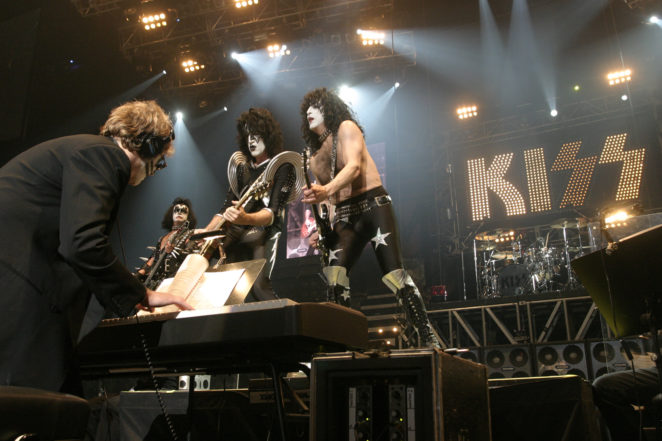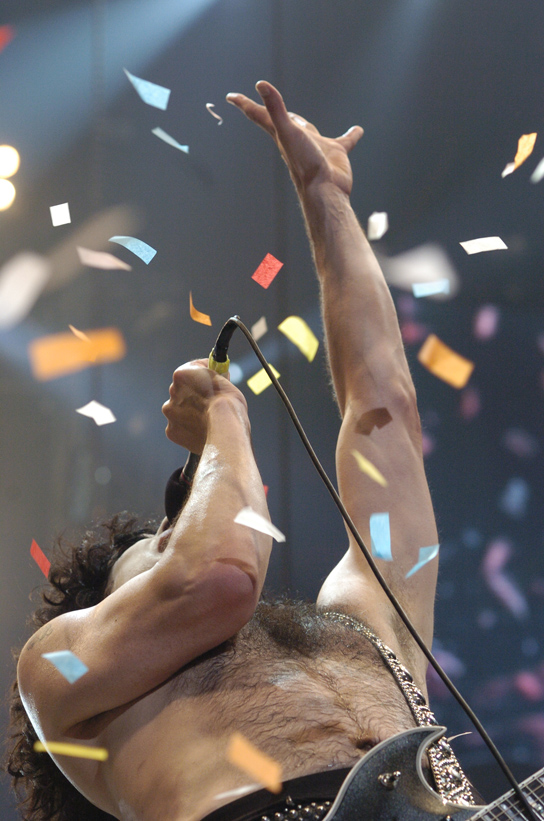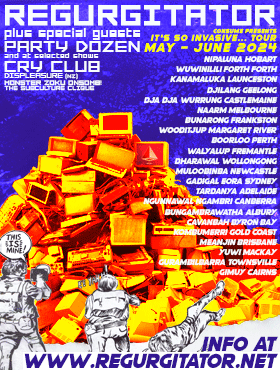June 2004. by Greg Phillips. Photos Marty Williams
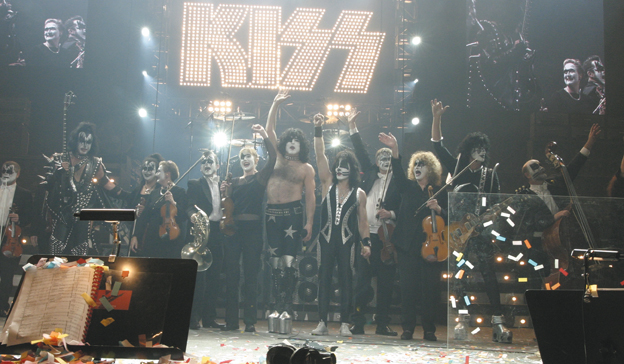
It wasn’t the first time a rock band had shared a stage with classically trained musicians, but the teaming of the Melbourne Symphony Orchestra with American rock legends Kiss at Melbourne’s Telstra Dome in February 2003 had to be the most mutually satisfying for all involved. So much so that merely 14 months later Kiss returned to Australia to catch up with their bow tie bearing buddies on stages nationwide for another tour. This time the band limited the classical backing to just twelve members of the orchestra in a half hour set of Kiss hits, but the effect on the senses was still colossal. Never before had there been such an aural and visual stage onslaught as created by Kiss and the MSO. It takes a special kind of orchestra to agree to contend with such distractions as heart thumping explosions, ear splitting volume, and relentless pyrotechnics but the MSO members not only nailed the gig, they did it with smiles on their faces. Some of the talented people involved in making the show work reflected on their achievements when they spoke to Australian Musician’s Greg Phillips.
PAUL STANLEY-KISS
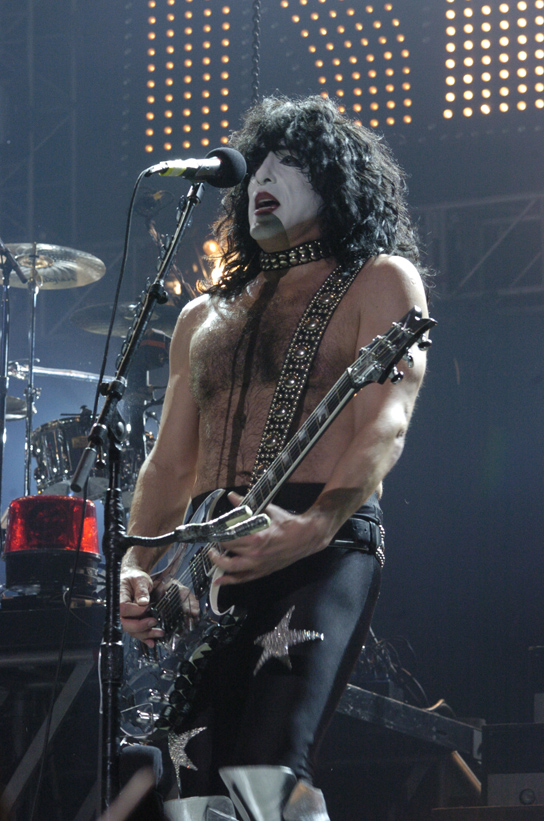 You’re revisiting the Kiss Symphony concept with the MSO doing half hour sets on this tour, but going back to the original gig at The Telstra Dome… what were the issues that you needed to sort out before you’d be comfortable going live with an orchestra?
You’re revisiting the Kiss Symphony concept with the MSO doing half hour sets on this tour, but going back to the original gig at The Telstra Dome… what were the issues that you needed to sort out before you’d be comfortable going live with an orchestra?
There were a few things which were key elements and one of them was finding an orchestra that not only had the ability to play the arrangements, but also wanted to, and I mean that in the best way. Interestingly there is a certain amount of snobbism in the classical community and that may well be based perhaps of ignorance of other music forms. The MSO is much more adventurous and open in terms of their path. I think that’s commendable. So first and foremost is was finding an orchestra who would not only do this, but do it with the right spirit. This wasn’t going to be a chore, this was going to be an adventure. Secondly it was a matter of coming to the project with great arrangements and David Campbell did a splendid job of writing the sheet music. Then when we all got into the same room together, it was a matter of trying to find a common language, because for lack of a better term, we are street musicians. When you are dealing with a classical lot like the MSO, we don’t really speak the same language. We can all get to the same place, but we may take different roads. We needed an interpreter so to speak, and again that was David Campbell. I might say let’s take this from the bridge, and for the orchestra it would be Bar 39. Then it was just a matter of rolling up our sleeves.
Did you go back and listen to what other bands had done with orchestras, such as Elton John with the MSO or what Metallica did with the San Francisco Orchestra?
I think Elton was very successful in what he did. Other projects might not mean that much to me, or impress me as much. Part of it (Kiss Symphony) was the way it was recorded. We had Mark Opitz an Aussie engineer/producer who did a spectacular job of recording and mixing. I think too often when rock musicians try to marry themselves with classical music, the results are often quite muddy. What we wanted to make sure was that you heard every instrument. And I think that was well accomplished. When I listen it is so grand in scope and it’s not because there’s an impression of an orchestra, but because you can make out the parts that each musician is playing.
What measures were taken to ensure you could hear the orchestra?
They were well miked and they were certainly in our monitors. You don’t want to miss the thrill of playing with an orchestra only to hear it back when you get back in the studio. Part of the rush and excitement was due to being immersed in it, while we were doing it.
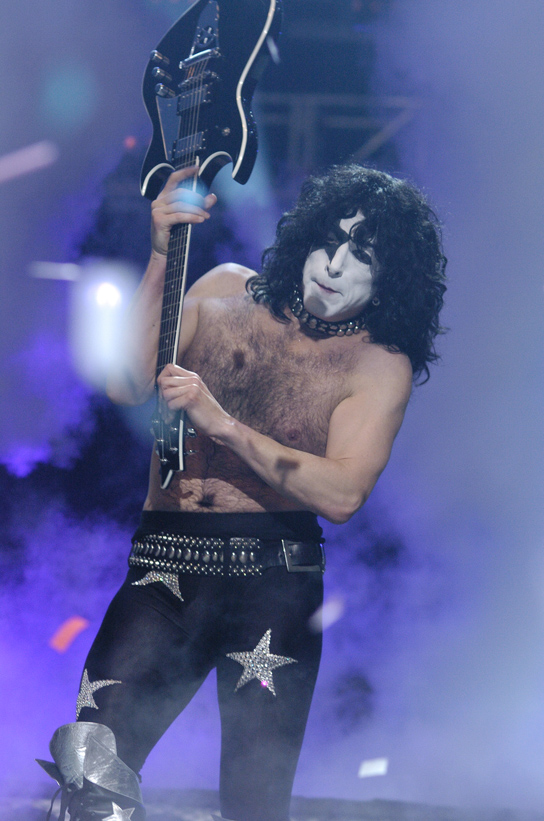
Is there a more relaxed feel this time around with the orchestra parts?
Of course. When we first agreed to do the Kiss Symphony at the Telstra Dome, we did it like many things we do, without full knowledge of what we were getting ourselves into. Had we known how involved it would be, we still would have sad yes, but I think we would have taken a deep breath before we did. We committed to something and it was only afterwards as we started piecing it together, the structure of it, that we began to realise how large a project it was. This time around we’ve done it and we’re on familiar ground with the musicians in terms of, you know, all of us having accomplishing something great together. Kind of like a reunion of sorts.
I was speaking with one of the MSO guys and he said one thing he noticed about your music was the keys you played the songs in (E flat or G flat or D flat) down a semi tone, were they the original keys some of the songs were written in?
Yes. It was very interesting because in hindsight ultimately, a lot of other bands ended up doing the same thing. We used to tune down a half step because in the early days of the band, my range wasn’t what it is today. It just made some of the vocals easier to sing. By coincidence it also gave a greater tonality to the guitars. But we’ve done that more out of tradition than anything else.
What have you learned from this whole experience?
I have to say that, without seeming egotistical, it kind of reaffirms for me that I have always been right, in the sense that there are only two kinds of music, good and bad. You can’t take something that isn’t great, and make it great by embellishing it, but you an take a concept, and music like Kiss and marry it to something equally credible and great, and come out with something that is much greater.
You guys are comfortable with explosions going on around you on stage, did you have fun watching the orchestra guys jump?
I was worried about that but they have become old pros. It’s fabulous to see musicians playing 300 year old violas and cellos and to see that work in harmony, no pun intended, with a bunch of guitarists plugged into huge hundred watt amplifiers.
You were kind enough to do a rave on stage about people experiencing the MSO in their own concerts after Kiss had gone, were you a fan of classical music prior to kiss Symphony?
It was the first music I ever heard. It’s so important to break down these barriers. Many people are intimidated by the idea of classical music, opera and even theatre. There is a perception that it’s a white glove affair for the elite who sit quietly and politely clap their hands together. Any way you can open the door and show people it is friendly on the other side is a good thing. I want to make sure the MSO gets the attention and the commendation for … really being trailblazers.
Tell me about the guitars you are using on this tour …
What I am using now and for the past year and a half are my Silvertones. My new line of guitars. There are two Paul Stanley models, the Sovereign and the Apocalypse.
What about amps?
My amps have been Randalls for quite some time
What is it about the Randall that you liked?
I designed it (laughs). It had all the qualities I loved in the Marshall amplifiers but instead of being a valve amp, it’s solid state.
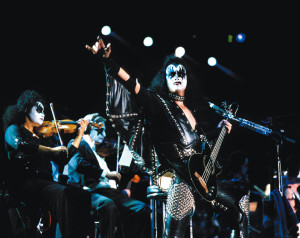 What’s the one thing that stands out in your mind about the Telstra Dome gig?
What’s the one thing that stands out in your mind about the Telstra Dome gig?
That it was ground breaking for all, and I think the MSO saw that intimacy can be had on any scale, and that 40,000 people can have a more intimate experience than 4,000 who are kept at a distance.
You’re off to do a tour with Poison, which finishes up in August, what then for Kiss?
It’s hard to say at this point. I think all bets are off in terms of what we do or where we go or when we do it. Once it became clear that the farewell tour was not a farewell after all, it became clear that … we’ll see where this road takes. It’ll be over when we just don’t come back anymore. It’s not something planned, I think that’s the lesson learned. Every thing is always in a state of flux and change.
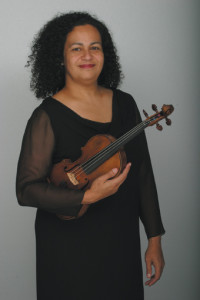 WILMA SMITH MSO CONCERTMASTER
WILMA SMITH MSO CONCERTMASTER
Wilma Smith has had a long and distinguished musical career. Highlights for Wilma include winning the prestigious Naumburg Award in New York in 1984 for excellence in chamber music, the appointment of Concert master of the Harvard Chamber Orchestra, and she has also played regularly with the Boston Symphony Orchestra. Wilma was appointed concertmaster of the MSO in 2003, and plays a mean violin with Kiss.
Is it essential to like Kiss’ music or any artist you are backing, to be able to perform the music whole heartedly?
I think you probably do have to like rock music, most of us do. I mean if you are in the MSO and you get asked to do it, you do it, but most of us like rock music anyway.
How did you cope with the pyrotechnics and the massive confetti storm at the end of the show?
OK. Not only was the band loud but also the explosions, so we had to look after our ears a little bit.
What was the one thing you remember vividly from the first live appearance with Kiss?
It’s hard to pick out one thing. The whole experience was exciting. A lot of fun. It took quite a lot of time to put together. It took quite a lot of time to get over it.
Did you get to know the guys from Kiss at all?
Last time I had a chat to Gene, he was quite taken by the age of my violin. This time I sat down for coffee with Paul and Tommy and they were really nice. It was nice to hang out with them, I genuinely liked them.
Tell me about your violin.
It’s an old Italian violin made in 1761. Made by Guadagnini and Ihave had it for 19 years. I’m very lucky to have it.
Do the pyrotechnics effect your instrument in any way?
Serious heat over a long time would, but not stage lighting for the duration of a show. When we were waiting onstage to go on just holding the instrument, the sheer volume of the sound coming out of the speakers I was thinking the whole thing might explode.
For young people who have no awareness of classical music, what would you say that they could possibly gain from experiencing it?
I think classical music does to you what nothing else does. It’s an experience that I think you can’t get with any other thing, but it’s hard to describe. We do some entry level programmes for people who haven’t experienced classical music before. I would say to people who haven’t been to a classical music concert to just come along and experience it for yourself.
PATRICK WHITELY-KISS PRODUCTION MANAGER
A band that owns a stage show as gigantic as Kiss’ requires a dedicated and talented bunch of technicians and crew to make it all work. At the helm of this amazing crew is Production Manager Patrick Whitely. Patrick began touring with rock bands in 1975 and by 1978 had scored the PM spot for the original Van Halen. Tours with David Lee Roth and Black Crowes followed leading to the production management role of the 1998 Family Values tour, which included Kiss and Poison. Whitely’s specialist skills have been summoned for every Kiss tour since, including the massive Kiss Symphony gig in Melbourne. Patrick kindly took a few minutes out of his extraordinarily busy schedule to speak with Australian Musician.
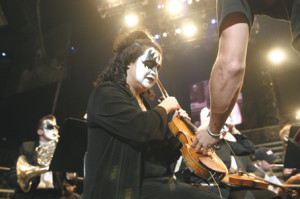 When you sat down with the band for the first time to talk about playing live with an orchestra, from a production point of view, what were the initial factors that you had to consider?
When you sat down with the band for the first time to talk about playing live with an orchestra, from a production point of view, what were the initial factors that you had to consider?
Talking about the original Melbourne show at the Telstra Dome … it was this full on Melbourne Symphony Orchestra, with a huge KISS Stadium show, and it was simply how do we make it blend, make it Big and make it work. We had a full secondary stage built at a nine feet height behind the stadium KISS set, which separated the orchestra from the pyro effects. This allowed us to have additional lighting for the orchestra behind the LED wall … and made it all work.
Once you got the orchestra together with the band, what other issues materialised? Anything totally unexpected?.
The main thing was the orchestra hearing themselves, but that was instantly solved with the use of headsets … just like a recording studio.
What was vibe like within the band after the first rehearsal with orchestra, and were you satisfied it would all work out fine?
The vibe was amazing. It was much better than I ever thought it would be, and it instantly worked. David Campbell (arranger/ conductor for Telstra Dome gig) did an amazing job, especially with the orchestral scoring.
From a production perspective, can you recall both the best and the worst Kiss gigs you have witnessed, and why they were so good/bad?
Worst had to be Arrowhead Arena, Anaheim in 2001. The flying gags failed. It was a big time full moon night, but no fun. I think the Melbourne Telstra Dome was the best (Kiss Symphony). Everything worked out. All good!
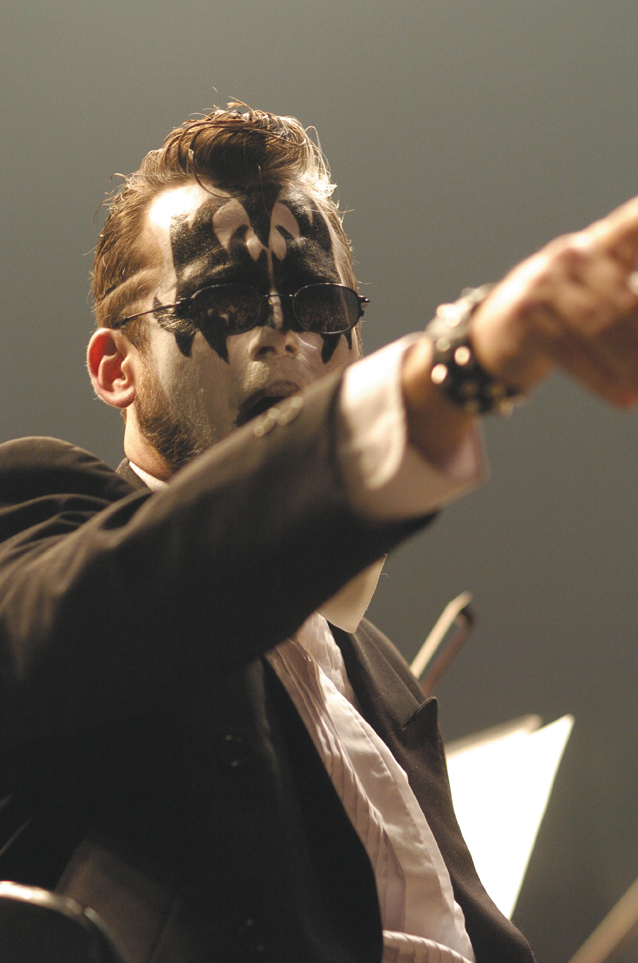 GEOFF LIERSE MSO FRENCH HORN
GEOFF LIERSE MSO FRENCH HORN
In addition to his numerous and highly acclaimed Concerto and Recital appearances, Geoff is also an accomplished chamber musician. When he’s not playing horn, the Doors/Who fan might be seen playing bass guitar on a stage somewhere in St Kilda or moshing to a band at The Corner Hotel.
How much difference in volume is there between Kiss and when you normally play with the orchestra?
I think it’s the pyros more than anything that we noticed. The guys from MGF and Grinspoon (support bands for the tour) that I’ve been hanging around with reckon we all jump a metre when the pyros are going off. But there’s some pretty meaty classical stuff around too. If you crank up The Ride of the Valkyries by the Vienna Philharmonic, that’ll get people banging on your roof with a broom too. But there’s something about a bass guitar and a rock n roll kick drum when they are really synchronised.
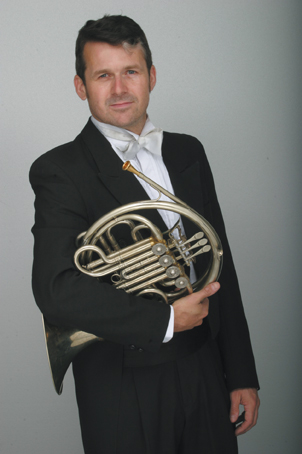
When you sat down with the band for the first time, what issues needed to be discussed?
The main dynamic to sort out immediately was if Paul Stanley was leading the band or do we follow the kit. Peter Criss had just rejoined the band. We had to find the groove and decide if we were sitting back on it or pushing it. The other thing was that a lot of the songs were down a semi tone… and there were some pretty fast licks in there for the strings too, so heads were stuck in the charts for the first half of the first call. Then when they came back this time, there were no problems, just like old friends, let’s rock n’ roll. We only had one really quick rehearsal on the stage at Rod Laver Arena this time. We wrote a few of the endings, but basically it was just watch Paul Stanley from then on and we couldn’t go wrong.
What do you think Kiss may have learned from the MSO?
A new way to have a great time on stage maybe? I don’t know. Man, we were learning so much from them. Things like respecting our audience… how to have a great time on stage and not being afraid to show it. Being proud of being up there. Paul was great. Every night he’d launch into this rave about how everyone in the audience should go to see the Melbourne Symphony in one of our own shows.
For information on upcoming MSO events, visit their website www.mso.com.au
